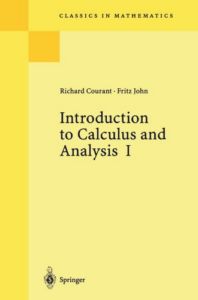I don't use the word "superior" lightly, but this book definitely warrants it. Courant was a first rate teacher and mathematician, and his brilliance shows in his exposition. The main obstacle to some readers may be that Courant does not follow the "cookbook calculus" approach that seems so rampant today, but actually bothers to prove his results. He does, however, reserve most of the more difficult proofs for the appendices at the end of the chapter, which is most appreciated.
The result is an exciting read, yet rigorous. The reader is very well prepared for future courses in mathematical analysis, and even has a leg up on real analysis. While Courant's insistence on proof does mean that the student needs to have a basic grounding in proof methods, this is usually a standard part of the undergraduate curriclum. Courant rightly recognizes that calculus should be taught in a logical, yet rigorous presentation from the beginning. The absence of this in modern texts mean that students learn how to manipulate formulas, but have no idea what makes the results they are assuming true. The "mechanics" of calculus and analysis, the most crucial thing to be learn, is missed.
In particular, I enjoyed his presentation of integration *before* differentiation, which goes against the grain of basic calc texts, yet is historically and pedagogically correct. Integration actually paves the way for differentiation, and gives more motivation for the FTC. Most texts on real analysis work in that order anyway, as an understanding of Lebesgue measure and integration is crucial to understanding the process of differentiation.
In addition, I don't think I have ever before or since seen such a careful explanation of the theory of the logarithm or exponential functions. Again, the presentation makes it work, as just introducing the "exponential function", then a little later, the "log function" as the "inverse" of the exponential function is, to put it mildly, artificial and distasteful. The natural progression from the definite integral definition of the logarithm to the exponential function is displayed in its full glory.
In short, Courant manages to present some of the most crucial results of calculus and basic analysis without boring the reader to tears with arcane details, or worse, leaving the reader hanging on important theorems and ideas. This is a balance only a great mathematician could strike, and it is clear why this book remains a classic after almost 60 years.
Note: The second volume of this work covers the multivariable portion of calculus, and will be more difficult to follow without prior exposure to the subject. However, the introductions to the theory of matrices and the calculus of variations are very readable, and it is recommended that the reader take the time to peruse them. Also, don't miss the material on special functions, lightly touched on in the first volume, but explained in fuller detail in the second.
In Collection
#6691
Read It:
Yes
#6691
Read It:
Yes
Calculus, Mathematical analysis
|
|
||||||||||||||||||
